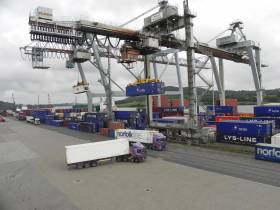Displaying items by tag: Irish maritime industry
Strong Growth for Irish Ports Across All Traffic Modes
#Successful2015 - According to the latest edition of the Irish Maritime Transport Economist (IMTE) the year 2015 has been successful for the maritime industry. The annual publication is issued by the Irish Maritime Development Office (IMDO).
The iShip Index, which measures the total volume of traffic moving through our national ports, recorded a 7% increase, with all major traffic modes delivering substantial growth.
Bulk traffic grew by 7% to reach 29.8 million tonnes, with Cork, Greenore, Shannon Foynes, Waterford and Wicklow recording above average growth rates.
LoLo traffic, moving predominantly through Dublin, Cork and Waterford, grew by 8% to 860,277 TEU, with each port recording significant volume gains.
RoRo traffic grew by 6% to 1,002,920 units, 88% of which was shipped through Dublin and 12% through Rosslare.
The total volume of traffic that moved through Irish ports in 2015 reached its highest level since 2008, at 977 points on the iShip Index. Although this is 7% lower than the peak of 1,042 points achieved in 2007, it represents substantial progress from the low of 693 points recorded in 2009, and is the highest level recorded since the beginning of the economic crisis.
Domestic economic conditions in 2015 contributed to the growth of the maritime industry. GDP was up by 7.8% to €203.5 billion and GNP was up by 5.7% to €171.9 billion. In value terms, exports in merchandise trade grew by 20%, while imports rose by 10%. The Central Bank of Ireland forecasts a continuation of this strong trading performance, with overall exports set to grow by a further 6.5% in 2016 and 4.9% in 2017. The Central Bank estimates that the value of imports will grow by 6.9% in 2016 and 4.4% in 2017. These strong growth rates bode well for the continued recovery and expansion of the Irish maritime industry.
Our ports are important gateways for inbound and outbound tourism and make a very significant contribution to the success of the tourism industry. More than 4.4 million passengers travelled through Dublin, Rosslare and Cork in 2015, availing of the many excellent ferry services that connect Irish ports to ports in Great Britain and France. A further 450,000 tourists experienced Ireland through port calls made by 246 cruise liners that called to Irish ports in 2015, an increase of 3% on the previous year.
Commenting on the strong performance of the industry in 2015, Liam Lacey, Director of the IMDO said “the economic contribution made by our ports to the broader economy is recognised in the Government’s integrated plan for the marine industry - Harnessing Our Ocean Wealth. The plan describes ports as enablers of economic growth. Their competitiveness and efficiency impact directly on international trade and have a direct influence on the job creation capacity of the economy.”
Director Lacey added, “As our ports move closer to the peak volumes handled in 2007/2008, it is important to address the need for additional capacity. Ambitious development plans, capable of meeting the growing needs of the national economy, have been progressed by Dublin, Cork, and Shannon Foynes and will be brought to fruition over the next five years. It is also important for other regional ports to consider the role that they will play in the provision of future capacity and in the achievement of the economic objectives set out in the Harnessing Our Ocean Wealth Strategy.”
“Apart from providing the infrastructure that is needed for shipping, our ports are important transport and logistics hubs for heavy industry requiring access to seaborne transport. A number of Irish ports have naturally occurring deep water and shore-side capacity to handle the largest ocean-going vessels and the cargoes they carry. Irish ports are also capable of providing the services and infrastructure required by the marine renewable energy industry, in which Ireland has a strategic interest.”
According to IMDO Director Lacey “The contribution that Irish ports can make to the broader marine economy by participating in these diverse activities is also recognised in the Harnessing Our Ocean Wealth Strategy and will be an important driver of growth in the maritime industry in the future”.
2015 was a good year for the Irish maritime industry and although the macro-economic and socio-political conditions that shape the performance of the global maritime industry are not without downside risks, our maritime industry is well positioned to take advantage of the forecasted growth in the Irish economy in the coming years.
NMCI Open Day: Let’s Sea What You’re Made Of
The open day is primarily aimed at fourth-year transition and leaving certicifcate students. For further information, enquiries and bookings for groups contact NMCI Tel: (021) 497 0607 by email: [email protected] and also the website: www.nmci.ie

























































